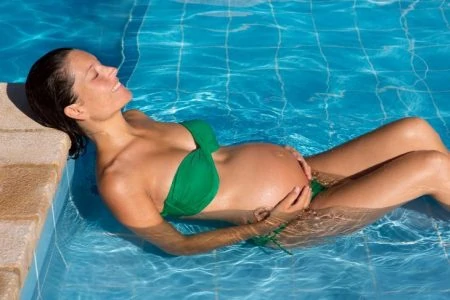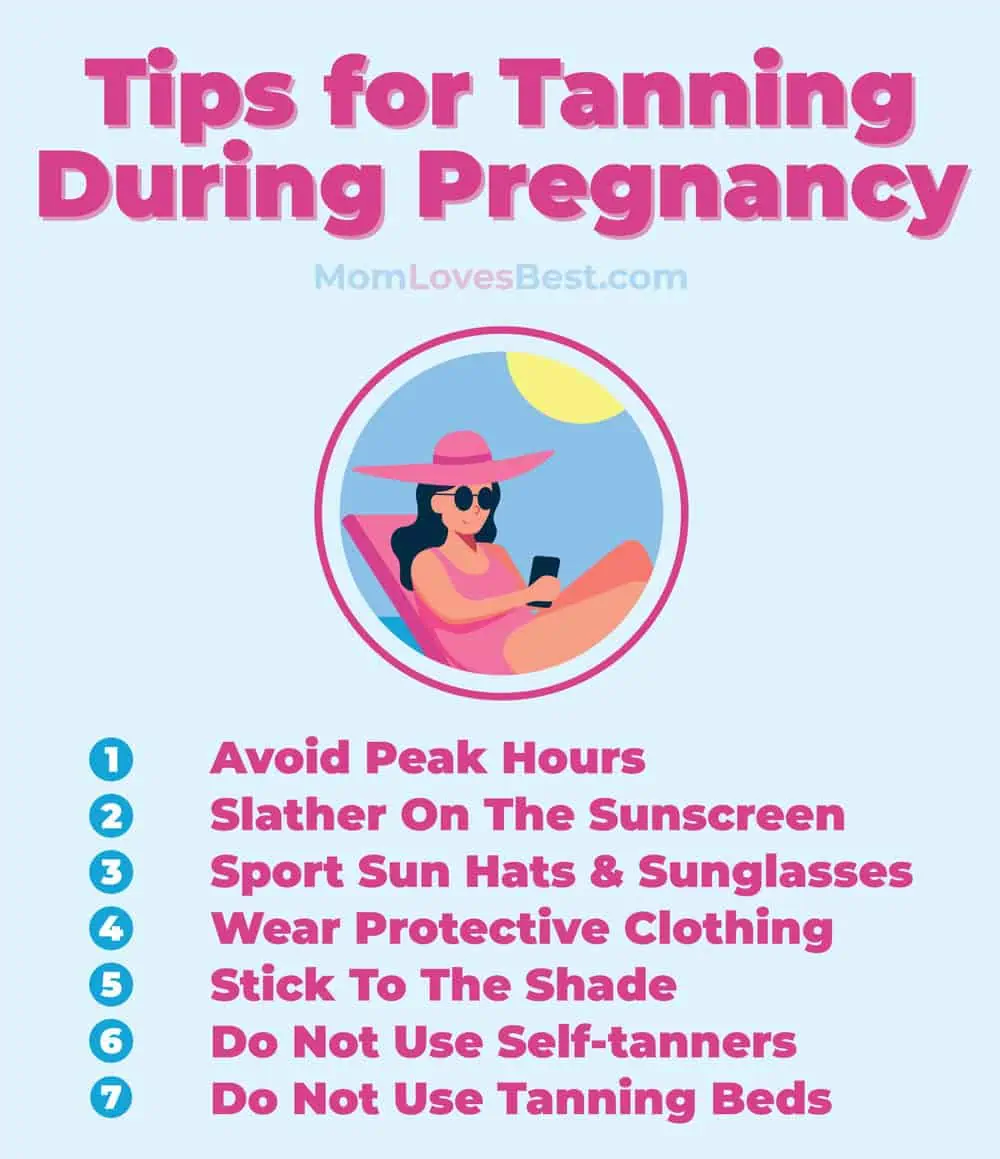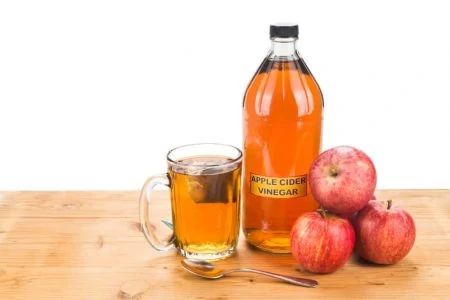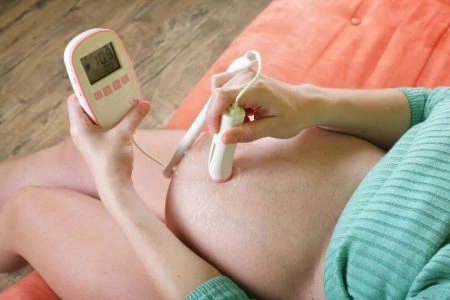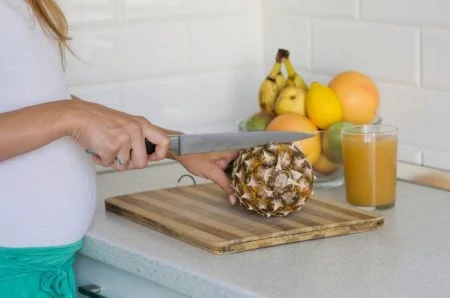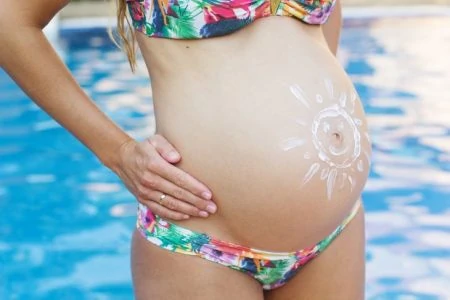If you love the feel of the warm sun on your skin and savor that bronzed glow, you may be wondering if it’s safe to suntan when you’re pregnant.
Sun-kissed skin may help you feel more beautiful and confident when you’re not feeling your finest, but protecting your skin, your health, and your growing baby should now be your number one priority. Everything you do and consume should be safe for pregnancy.
So, what about tanning? Is it safe for pregnancy, or is it on the list of things to avoid?
We’ve reviewed all the recent research to answer your questions about tanning while pregnant. We’ll discuss what the science says about sunbathing, tanning beds, and self-tanners during pregnancy and offer tips for protecting your skin.
Key Takeaways
- Sunbathing during pregnancy can increase risks of sunburns, chloasma, and dehydration; moderate sun exposure is needed for vitamin D production.
- Tanning beds are not safe for anyone, especially pregnant women, due to concentrated UVA rays and potential folic acid breakdown.
- Protective measures such as sunscreen, sun hats, sunglasses, and shade are important for pregnant women spending time outdoors.
- Self-tanners might not be safe during pregnancy; avoid spray tans and consult a doctor before using lotions or gels.
Is Sunbathing Safe During Pregnancy?
Soaking in some sun can be relatively safe during pregnancy. After all, the sun is our number one source of vitamin D and can protect against several diseases, prevent depression, and boost the immune system.
But, very little sun exposure is needed to provide you with your body’s and your baby’s needs. Plus, supplementation is always an option, and your prenatal vitamin may already have some vitamin D in it.
While there’s no clear evidence that natural ultraviolet (UV) rays will directly harm your baby, your skin might be more sensitive during pregnancy because of all the hormones flooding your body. You’re more susceptible now to sunburns and dark-brown splotches known as chloasma, which is also called “the mask of pregnancy.”
You’re at higher risk of dehydration during pregnancy, as your blood volume is much higher, making it more difficult for your body to retain fluids. You’re also at higher risk because you’re more prone to nausea and vomiting.
Take Note
If you’re going to be spending time in the sun, make sure you’re drinking lots of water, and watch for any signs of dehydration, like dark urine, headaches, infrequent urination, dry mouth, and dry skin.
How Can I Protect My Skin?
You must take some extra steps to protect your skin, yourself, and your baby while you’re out in the sun.
Protect your bump from too much sun by following these tips:
- Avoid peak hours: The stronger the UV rays, the higher your risk for sun damage. UV rays are strongest when the sun is at its highest in the sky, so avoid or limit your time outdoors between 10 a.m. and 4 p.m.
- Slather on the sunscreen: Be sure to slather on some sunscreen 15 to 30 minutes before going outside, and reapply every two hours. Use it even if it’s cloudy out (1). But now that you’re expecting, you’ll want to avoid sunscreens with oxybenzone, as this chemical readily absorbs into the skin and has been linked to low birth weight, high blood pressure, type 2 diabetes, and hormone imbalance. Sunscreens that contain zinc oxide or titanium dioxide and have an SPF of 30 or higher are best to use during pregnancy.
- Sport sun hats and sunglasses: Protect your sensitive scalp with a fashionable sun hat, and protect your eyes with lenses that offer 100 percent protection from UVA and UVB rays.
- Wear protective clothing: If you can, wear loose-fitting, tightly-woven clothes that cover your arms and legs. You can also buy clothing made with special sun-protective fabric to protect your skin from harmful UV rays.
- Stick to the shade: Make sure to get plenty of shade if you’re planning on being outside for an extended period or during peak hours.
Another downside of tanning, particularly tanning your abdomen, is that when the baby is born and your skin shrinks, your belly skin will appear much darker than the rest of the body. I’ve had patients do this who later regretted it.
Are Tanning Beds Safe for Pregnancy?
Indoor tanning beds are not a good idea whether you’re pregnant or not. The ultraviolet rays in tanning beds are more concentrated than what the sun provides, and the kind they use (UVA) has a clear link to skin cancer.
Several studies have shown that people who use a tanning bed — even just once — before age 35 increase their risk of developing melanoma by 75 percent (2). I don’t know about you, but that’s certainly not a risk I’m willing to take.
UVA rays can also cause premature skin aging, sun spots, blemishes, and damage to the eyes, such as conjunctivitis and cataracts. Your children are already going to give you wrinkles, so why add more?
UV rays could also break down folic acid, which is a crucial building block for developing your baby’s nervous system. Your baby is at higher risk of negative effects from UV rays during the first trimester, as this is when the foundation for brain development is being formed (3).
Take Note
But concentrated UV rays aren’t the only concern with indoor tanning. The extreme heat of tanning beds also poses a danger to pregnant women. If your body temperature rises above 102 degrees Fahrenheit, you could cause some serious developmental damage to your unborn baby, not to mention putting yourself at risk for dehydration.
You’re also not supposed to be lying on your back for long, as this can restrict blood flow to your baby and leave you feeling dizzy, nauseous, and short of breath.
Does a Base Tan Help Protect Your Skin?
A base tan does help protect your skin but only minimally. Your skin is still going to get damaged if you don’t take any other precautions.
If you’re going on a beach babymoon, you’re much better off slathering on some sunscreen and wearing a sunhat and sunglasses.
Are Self-Tanners Pregnancy-Safe?
The evidence is unclear if self-tanners, such as lotions, gels, and sprays, are safe for pregnancy. Therefore, most health care providers recommend avoiding them during pregnancy.
The main concern is with dihydroxyacetone (DHA), the active ingredient in all tanning products which creates the brown pigment on the skin. DHA is thought not to be able to make it past the first layer of skin, meaning your body won’t absorb it in a way that could reach your baby. But again, we don’t know this for sure (5).
And, as mentioned earlier, all the extra hormones make your skin more sensitive, so while lotions and gels may perhaps be safe, you’re more prone to allergic reactions and general irritation. If you do decide to use bottled tanning lotion during pregnancy, start by applying some in a small area to see how your body reacts before applying it everywhere. It might also be a good idea to check with your doctor as well.
Stay Away From Spray Tans
If you’re a beautician who does spray tan applications, make sure you wear a mask or speak with your boss about avoiding these for the remainder of your pregnancy.
FAQs
Think Before You Bronze
So, is tanning safe during pregnancy?
Sunbathing might not harm your unborn baby, but you’re at higher risk for sunburns and dehydration now that you’re expecting. You are also putting yourself at a higher risk of possible skin cancer down the road.
What about lotions? Perhaps, but the facts aren’t clear.
You should definitely avoid tanning beds and spray tans. Your best bet is to skip the tanning altogether and embrace that pregnancy glow.
